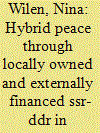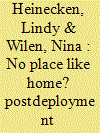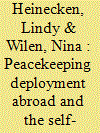|
|
|
Sort Order |
|
|
|
Items / Page
|
|
|
|
|
|
|
| Srl | Item |
| 1 |
ID:
196290


|
|
|
|
|
| Publication |
Cambridge, Cambridge University Press, 2022.
|
| Description |
xvi, 242p.: figures, maps, tablespbk
|
| Series |
New Approaches to African History
|
| Standard Number |
9781108713498
|
|
|
|
|
|
|
|
|
|
|
|
Copies: C:1/I:0,R:0,Q:0
Circulation
| Accession# | Call# | Current Location | Status | Policy | Location |
| 060711 | 355.3/FIS 060711 | Main | On Shelf | General | |
|
|
|
|
| 2 |
ID:
116875


|
|
|
|
|
| Publication |
2012.
|
| Summary/Abstract |
This article aims to critically examine Rwanda's security sector reform and disarmament, demobilisation and reintegration (ssr-ddr) process through a theoretical framework outlining four different models of peace processes in order to identify the sort of peace that can emerge from Rwanda's ssr-ddr approach. The author analyses how the Rwandan government has managed to keep the process 'locally' owned, while largely financed by external actors, despite strong criticism of its apparent lack of democratisation. The 'genocide credit', the Rwandan government's preference for national, rather than international solutions and its recent troop contribution to peacebuilding operations in the region are identified as the main reasons for this development. The paper argues that the peace emanating from the ssr-ddr process may be considered a hybrid form of state formation and state building, because of the local agency's preference for security and stability while simultaneously enjoying financial and technocratic support for its 'liberal' peacebuilding actions in the region.
|
|
|
|
|
|
|
|
|
|
|
|
|
|
|
|
| 3 |
ID:
121153


|
|
|
|
|
| Publication |
2013.
|
| Summary/Abstract |
The Congolese security sector reform - disarmament demobilisation and reintegration (SSR-DDR) process has suffered from setbacks in its military sector during the last 10 years, such as insufficient funding, lack of coordination and domestic reluctance to major changes, with as a result, a very fragile and disjointed Army. These problems have deepened as officers have defected from the Army and caused new instability in the East of the Congo. This article aims to analyse the recent mutinies and the reaction by the Congolese government by applying a capabilities-based approach in combination with a typology of spoilers. The objective is to identify and classify the spoilers and answer the questions of why they emerge now and how they are dealt with on a national level. From the analysis, the author suggests that there are several spoilers involved in the current situation - the most powerful being the Congolese and the Rwandan governments, prompting the question of whether an international involvement is necessary to solve the problem.
|
|
|
|
|
|
|
|
|
|
|
|
|
|
|
|
| 4 |
ID:
178345


|
|
|
|
|
| Summary/Abstract |
This study focuses on soldiers returning from peacekeeping missions and the challenges they experience adapting to the home environment in the postdeployment phase. The article focuses on South African peacekeepers returning from missions in Darfur/Sudan, the Democratic Republic of Congo, and Burundi. Interviews with 50 South African peacekeepers on the challenges they face in terms of their homecoming, family reintegration, and military support were conducted. Overall, the study found that both external military factors such as deployment length and nature of mission, and internal factors specific to the soldier affected reintegration. We highlight three major findings of our study: Firstly, our analysis show that peacekeepers across gender, rank, and race identify the absence from their children as a major challenge. Secondly, while relational turbulence characterized by ambivalence and concerns about infidelity was prevalent among all, there was a clear difference in the answers between the male and female peacekeepers. Thirdly, a large majority voiced the need for more support from the military institution for their families, before, during, and after deployment.
|
|
|
|
|
|
|
|
|
|
|
|
|
|
|
|
| 5 |
ID:
151531


|
|
|
|
|
| Summary/Abstract |
During the last three decades, international peace operations have multiplied. As a consequence, trainings and deployments for peace missions have become an essential part of the military’s work. Yet the importance of peace operations to the individual soldier’s career development has so far been relatively absent in academic writing. This article attempts to fill this gap by examining how soldiers perceive the effects of their peace operation deployments in terms of career opportunities and status upon reintegration in the home unit. Adopting an inductive approach, the authors analyse 50 interviews conducted with military personnel from the South African Defence Force (SANDF). The findings show mixed responses in terms of the effect of deployments on career development. In general senior staff value the experience acquired more highly than lower ranks who experience multiple deployments as having a negative effect on vertical career mobility. Nor do lower ranked personnel see any marked change in the (in) formal status upon reintegration back into their national armed force, while higher staff officers perceive an enhanced status especially where this is related to operational success. The article argues that peacekeeping deployment should be seen as a process, which has consequences for the individual soldiers’ career long after homecoming, rather than as an independent event during a lifelong career.
|
|
|
|
|
|
|
|
|
|
|
|
|
|
|
|
|
|
|
|
|